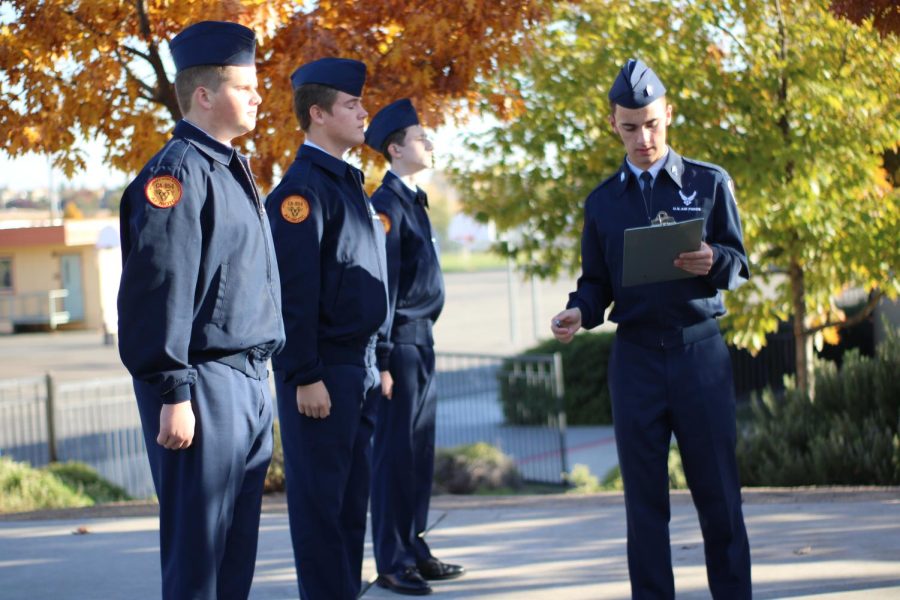ROTC students prepare to pass down their leadership positions to others in the program, who will lead according to their new rank
In front of the ROTC building Nov. 17, Cadet Senior Airman Alex Glasgow does a uniform check for his AS-1 flight. Photo by Isabel Soto
This semester in the ROTC program, students in higher rank are getting ready to pass down their position to trustworthy and responsible cadets. Flight commanders, squadron commanders and group commanders are all discretely selecting the next round of leadership roles in Unit CA-954. The students selected are those who they believe are best fit for the role. Current commanders will spend the next five months overseeing the new round of commanders.
“We have a saying that goes, ‘You get out what you put in’. So the more effort you put in, the harder you work with your uniforms and studying information, and actually trying to learn, the more likely you are to get higher positions,” Kaleb Soliza said.
Soliza is of the highest rank of the program, a group commander, who oversees each level and every function of the various classes. He has the title of Cadet Colonel. Soliza worked diligently through the program for four years to get into the position that he is currently in. Soliza works directly with Maj. Jennifer Pearl and Sgt. Terry Barber to plan and make crucial decisions for the program.
Each level of position emphasizes the hard work that should be put into the class. Those in higher positions hope to teach the importance of every aspect of the program. The different AS-1 flights, or classes, expand their knowledge, starting from learning what it means to be part of ROTC and gaining information on how to properly do drills.
“I teach [AS-1 flights] what it means to be a part of ROTC and how to drill. [I] just teach them how to be good people,” flight commander Alex Glasgow said.
What one might not acknowledge are the elements that are required to keep the ROTC program running smoothly and successfully. There is a ranking system within the program where cadets work to achieve strong leadership skills and possibly attain one of the higher positions. This position cannot be gained unless their desire to improve and dedication to learning is clearly demonstrated.
“Throughout the years, you jump in different positions [and] do your best in that position. Bloom where you’re planted. If you do well or we think you have potential, you go up another rank and just keep going,” Soliza said.
In the first year, one would start out as a cadet in their AS-1 flight. In the class, they are introduced to the basic material of the program, valuable leadership skills and how to be independent but also to cooperate with the other cadets.
“I was in their position last year, and it’s difficult. So I don’t blame them if they have any questions, or if they just want help with it,” Glasgow said.
A flight is mentored by two flight commanders who work together to guide and oversee the flights. They help the new cadets learn and guide them in the program while also expanding their knowledge. A crucial part of the job is mentoring the students to be hardworking and valuable people within the program. The eventual passing on of their position is very important, allowing a freshman to teach others and continue the program.
“It feels great. It’s a lot of weight off of my shoulders but I’m also really grateful that I have someone who I can pass it down to that I trust. I know they will carry the flight out to their best potential,” Glasgow said.
“Like I said before, you get out what you put in. So as long as you try and put an earnest effort, you’re sure to do well,” Soliza said.
As rising members await the announcement of the new leadership, the higher ranks are preparing for their annual Military Ball. ROTC will announce the new flight commanders, squadron commanders and group commanders at the event Jan. 28 at Destiny Community Center. The following day, there will be an announcement of all the new positions on the position board in front of their classroom.
by WYNETTE CALUNSAG AND ISABEL SOTO








